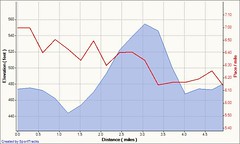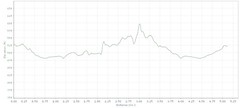First Week: Garmin Forerunner 205 Review Wrapup
Unless my new Garmin Forerunner 205 (the second one) explodes on me or suffers major quality or GPS accuracy issues, this post will serve as a wrap-up review of the Forerunner 205 after playing with it for one week.
However, before I jump into summarizing my thoughts, I first one to touch on my run this morning where I tested the course and virtual partner features. This morning was my seventh day running with the 205 (4 with the broken power button unit and 3 with the replacement - thanks Garmin customer service for the quick turnaround!).
I've been sort of sidetracked from my usual training schedule in my enthusiasm to test the 205 and compare it with my Forerunner 201. Plus, the extra mileage was making me feel a bit rundown. The recent rains in Northern California didn't help either.
For today, I decided to get back on schedule and put in a steady half-marathon/marathon-paced effort over a course in my town that is used by the local high school for its annual Fourth of July 5 mile fundraising race. I use this route for tempo-like efforts and I start and end at a different place, and don't run the tangents so it comes out to around 5.1 miles.
I've been wanting to use the 205's course and virtual partner feature, but since I haven't run this route yet with my 205, I needed to find another way to get the course onto my device. Brad Culberson at MotionBased has developed a neat little online course creator that allows you to plan a route using Google maps, pick a pace for that route and then save it to your PC. Using Garmin's Training Center software, you can then upload the course to your Forerunner 205. Not wanting to lose to my virtual partner, I chose a conservative 7 minute mile pace and after plotting the course it came out to be 5.1 miles as well. Now I was all set.
The weather this morning was rainy as usual and I warmed up by running 1.7 miles to the start of the 5.1 mile course. I saved this activity and reset the 205. I went into the Training menu, selected courses and then the course I had created and uploaded. I chose Do Course, pressed start and I was away.
With virtual partner enabled as well, you get two extra screens and a revised main screen. The revised main screen tells you how much of the course distance and time is left. The first extra screen is of two graphical running icons and the distance separating you from the virtual partner based on the goal pace (i.e. 7 min/mile) and the actual pace/distance run. The second extra screen shows your progress as a dot along an elevation graph. If you have maps enabled on the unit, you can also hit mode to chart your progress via the route.
Virtual partner is kind of gimmicky, but it was fun to see myself virtually pull away during the run. I ended up getting in a pretty decent effort and I heard victory beeps right at the finish notifying me I had beaten my VP. I then finished up with a 2.4 mile cooldown.
Plotting the route (and measuring it for that matter) was pretty accurate via the online mapping tools so if you run solely on roads and don't need the latest gadgets and data then this might be a free way to measure your runs. The other cool thing about the 205 is now I can create a course from today's effort (route, distance and time) for use at a later time. This course will be at today's pace so if you like to measure your progress (or lack thereof) over a specific route then VP is for you.
Details of the 5.1m mile run can be found at MotionBased.Below are two graphs of the elevation along the route. The first is taken from SportTracks and charts the elevation and distance with my pace. The second chart is from MotionBased and only shows elevation as it corresponds to distance.

With that out the way, here is my first week wrap up of my likes and dislikes of the new Garmin Forerunner 205 as well as cool stuff and wishlist for the future:
Likes
- Comfort and Form factor: Usage model is very important and while the 205 is big, it feels and wears like a wrist watch. The plastic strap is more comfortable than the 201's velco strap, and the unit also comes with an extension strap if you need to bundle up and wear it outside your clothing. Personally, I want to look at my watch for instant data (i.e. time, pace, distance, etc) and feedback so I'm unwilling to place a device on my upper arm even if I have to sacrifice accuracy. In terms of form factor, the lap and start/stop buttons are well placed and sized on the face of the watch.
- GPS Accuracy: The Garmin Forerunner 205's GPS receiver seemed much stronger. I can lock onto a signal inside my house next to a window, I haven't received one weak signal in a week over routes that caused my 201 trouble. And on my one run over a tree-covered, GPS signal-challenging course, the 205 came out a star, finally allowing me to measure a route that I was unable to with my 201. The GPS accuracy data field and the satellite acquisition screen are also cool bonuses.
- Customization: The 205 allows you to customize 2 main screens and a third activity specific (i.e. run, bike or other) one with 1 to 4 data fields per screen. This is very cool, especially for data-driven geeks like myself. Another great thing about all the Forerunners is you can customize screens and settings on the fly without interrupting your current activity.
- Real-Time Pacing: I'm not that interested in knowing how fast I'm going at a specific moment in time so never was a big fan of the "real-time" pacing feature of the 201. With that said, the 205 seemed to be more consistent and showed a tighter range of paces. It also seemed closer to how fast I felt I was going relevant to the current conditions (i.e. uphill, downhill, flat) than the 201, which showed a lot of variation and lag.
- USB Cradle: Charging and uploading via USB is a nice. Much faster than the 201's serial port.
Dislikes
- Display: The display of the 205 seems smaller and the history screens are dark and hard to read. I wish they didn't use the shading and just had the plain background.
- Real-time elevation: For me this isn't a big deal, but the "real-time" elevation reading lags on the 205. It seems to tie closely with GPS accuracy. For example, after I finish my runs I'll usually walk a little in my backyard to cool down. The real-time elevation reading will then "catch up" to the correct elevation.
- Buttons: My broken power button seems to be an anomaly so far since I haven't read of others with the same problem. With that said, the side buttons seems a bit stiff to me.
- Battery indicator: It just shows 4 vertical bars. I liked the feature on the 201 where it told you how many hours of charge were left when you powered it on.
Cool Stuff
- Tons of features: There are a lot of things the 205 can do such as import courses, advanced workouts, virtual partner and a bunch of other features that I need to explore
Wishlist
- Reduce form factor
- Color screen
- Increase battery life
- Improve waterproofing/water resistance
- Add wireless connectivity for uploading and downloading data and information over the air to PC or mobile service
So that's it for now. I hope you found these reviews helpful. Next up I hope to review Bones in Motion's BiM Active service. BiM Active is a mobile service currently through Sprint that provides GPS personal fitness tracking and logging via a cellphone. Once I get a Sprint handset to play with, I hope this will be my next review project....
Here are links to:
- First look at the Garmin Forerunner 205
- First run comparing the Forerunner 205 with the Forerunner 201
- Day 2: Garmin Forerunner 205 Solo Run
- Day 3: Another Comparison Run with the Garmin Forerunner 205 and Forerunner 201
- Day 4: Garmin Forerunner 205 Solo Run Over Forested Trail
- Garmin WebUpdater 2.3.2 (March 20, 2006)
- Garmin Forerunner 205 Software Update to version 2.40
- Garmin Forerunner 305 Software Update to version 2.40
- Five-part review comparing Bones in Motion BiM Active GPS Mobile Service with Garmin Forerunner 205
- Garmin Forerunner 205/305 GPS Tips
Technorati Tags: Garmin, GPS, Global Positioning System, Satellite Navigation, Forerunner


<< Home